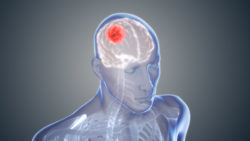The most complex and largest organ in human body is the Brain. It comprises of over 100 billion nerves which help to communicate with trillions of connections known as synapses.

There are many specialized areas in the brain that work together:
- The outermost layer of brain cells is called Cortex, which helps in thinking and voluntary activities.
- Breathing and sleeping are controlled by Brain Stem, which is found between the Spinal Cord and rest of the brain.
- Brain has a cluster of structure called Basal Ganglia which is found in its center. It helps in coordinating messages between multiple areas of brain.
- The cerebellum has the responsibility for coordination and balance functions. It is found in the base and the back of the brain.
The brain is also divided into various lobes:
- The frontal lobes have the responsibility for motor functions, judgment and problem solving.
- The parietal lobes takes care of handwriting, body position and sensation.
- The temporal lobes have involvement with memory and hearing.
- The brain's visual processing system is contained in the occipital lobes.
A layer of tissue known as the meninges surrounds the brain. The skull (cranium) aids in protecting the brain from an injury.
Conditions of the Brain:
- Headache: There are several types of headaches; most of them are not very serious and commonly treated with painkillers or analgesics
- Stroke (brain infarction): In this condition, the blood flow and oxygen are abruptly interrupted to an area of brain tissue, which then dies. The causes of most strokes include blood clot, or bleeding in the brain.
- Brain aneurysm: In this condition, an artery in the brain develops a weak area that swells like a balloon. Its bursting could result in a stroke.
- Subdural hematoma: There is bleeding within or under the dura which is the lining inside of the skull. This condition may exert pressure on the brain that may result in neurological issues.
- Epidural hematoma: There is bleeding between the dura (which is a tough tissue lining inside of the skull) and the skull itself, most commonly shortly after some head injury. In case it remains untreated, the initial mild symptoms could progress rapidly to unconsciousness and eventually even death.
- Intracerebral hemorrhage: There is some bleeding inside the brain.
- Concussion: It is a brain injury that results in a temporary disturbance in brain function. Concussions are usually as a result of traumatic head injuries.
- Cerebral edema: In this condition, there is swelling of the brain tissue due to any injury or electrolyte imbalances.
- Brain tumor: There is abnormal tissue growth inside the brain. They usually cause problems by the pressure exerted on the normal, whether they are malignant (cancerous) or benign.
- Glioblastoma: This is an aggressive, malignant brain tumor usually cancerous. They progress quickly and are very hard to cure.
- Hydrocephalus: In this condition, there is an abnormally enhanced amount of cerebrospinal (brain) fluid inside the skull. This is often due to improper circulation of fluid.
- Meningitis: In this condition, there is swelling of the lining around the brain or spinal cord, usually from some kind of infection. Some of the common symptoms are stiffness in the neck, pain in the neck, headache, fever, and sleepiness.
- Encephalitis: This condition usually happens due to infection with a virus which causes inflammation of the brain tissue. Some of the common symptoms are fever, headache, and confusion.
- Parkinson's disease: In this condition, the nerves brain’s central area degenerate slowly, causing issues with movement and coordination. A common early sign is tremor of the hands.
- Huntington's disease: It is an inherited nerve disorder that affects the human brain. Some of the common symptoms are dementia and problem in controlling the movements.
- Epilepsy: In this condition, there is a tendency to have seizures (fits). Usually no specific cause is identified, however, often the head injuries and strokes cause epilepsy.
- Dementia: In this condition, there is deterioration in cognitive function due to death or malfunction of nerve cells in the brain. Dementia is caused usually due to conditions in which there is degeneration of nerves in the brain, as well as due to strokes and abuse of alcohol.
- Alzheimer’s disease: Alzheimer’s disease is the most trivial form of dementia. In this condition, the nerves in certain brain areas degenerate causing progressive dementia for not very well understood reasons.
- Brain abscess: It is usually due to bacterial infection in a pocket of the brain.
There are several other conditions such as normal pressure hydrocephalus,
traumatic brain injury.
Disclaimer: The information in no way constitutes, or should be construed as medical advice. Nor is the above article an endorsement of any research findings discussed in the article an endorsement for any of the source publications.
Sources-
- https://www.webmd.com/brain/picture-of-the-brain#1
- https://www.webmd.com/brain/picture-of-the-brain#2
Based on the type of brain cell from which the tumor originates, a brain tumor may be classified as Glioma, Astrocytoma, or Meningioma.
Read More..
Organoids aren’t science fiction anymore. Going by the advances in tissue culture techniques, it is now possible to grow 3D ‘organ buds’: lab-grown bundles of cells resembling an organ (heart, liver or intestine) which are employed to study development, test drugs and understand diseases.
Read More..










